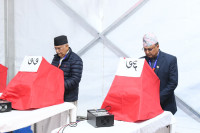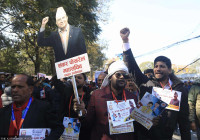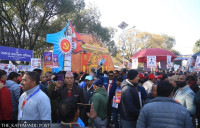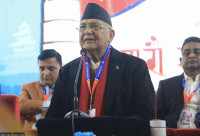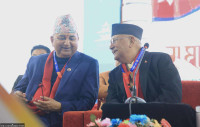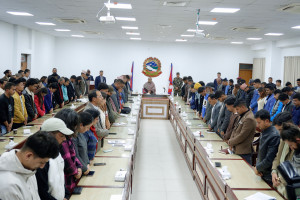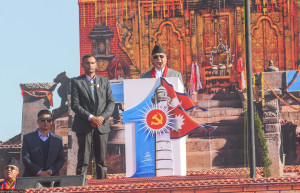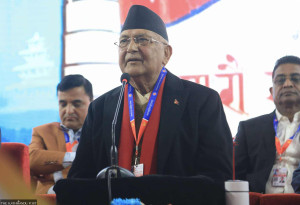Politics
Thapa becomes Koshi chief minister twice within month
Uddhav Thapa’s second innings was possible after the Maoist Centre persuaded Speaker Gautam to resign.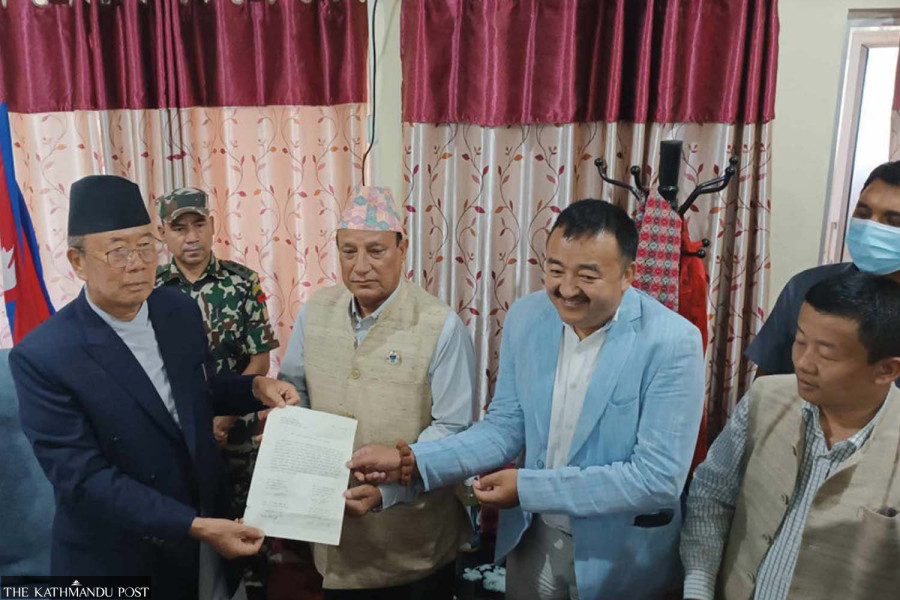
Tika R Pradhan
Nepali Congress parliamentary party leader of Koshi Provincial Assembly Uddhav Thapa has become the chief minister of the provincial government for the second time within a month.
On Tuesday, Province Head Parshuram Khapung appointed him chief minister again. Earlier the coalition leaders had convinced Speaker Baburam Gautam, who was from the Maoist Centre, to resign so that his backing could ensure a majority.
After the Speaker of the Provincial Assembly, Baburam Gautam, tendered his resignation, Thapa laid claim to the executive position by presenting to the province head the signatures of 47 assembly members from the Congress, the CPN (Maoist Centre) and the Janata Samajbadi Party.
Thapa lost his position on July 27, following the Supreme Court’s ruling that the government formation process, which saw an active involvement of the Speaker, was unconstitutional.
A full bench of justices Ishwar Prasad Khatiwada, Ananda Mohan Bhattarai and Til Prasad Shrestha directed the head of the Koshi Province and Speaker of the provincial assembly to appoint a chief minister of a coalition government within seven days.
Khapung, the province head, had appointed Thapa as Karki’s successor on July 6 after the ruling alliance produced the signatures of 47 lawmakers including that of the Speaker.
However, as the court said the Speaker cannot take sides and deemed the appointment of chief minister using his signature unconstitutional, there was only one option left for the ruling coalition: to ask the Speaker to resign his post so that he could take part in the government formation process.
Gautam, who was reluctant to put in his papers, needed a lot of convincing from Prime Minister and Maoist Centre chief Pushpa Kamal Dahal on Tuesday. Dahal tried to emphasise the importance of Gautam’s resignation in order to form a coalition led by Thapa.
Thapa became the chief minister of a coalition government on both occasions as provisioned by Article 168(2) of the constitution.
Article 168 (2) says if no party has a clear majority in the assembly, the province head will appoint as chief minister a member of the assembly who is able to command a majority with the backing of two or more parties.
Thapa had replaced the then chief minister, Hikmat Bahadur Karki of the UML, who had lost the position after failing to secure the vote of confidence during the floor test in the provincial assembly on June 30.
Constitutional experts termed Tuesday’s development, in which the Speaker resigned to take part in government formation, an unfortunate incident in parliamentary tradition.
“Even though the Speaker’s resignation has helped give continuity to the old coalition government, an independent Speaker taking sides in government formation, nonetheless, sits uneasy with the parliamentary system,” said Chandra Kanta Gyawali, a constitutional expert. “The constitution could have provided a way out even if the Speaker had not resigned.”
Government formation in Koshi was tricky due to a curious political equation in the provincial assembly.
The 93-strong assembly has 40 lawmakers from the UML, 29 from the Congress, 13 from the Maoist Centre (including the Speaker), six from the Rastriya Prajatantra Party, four from the CPN (Unified Socialist) and one lawmaker from the Janata Samajbadi Party.
The coalition of Congress, Maoist Centre, Unified Socialist and Janata Samajbadi Party altogether have 47 seats, which is the bare minimum required to form the government. The opposition parties UML (40) and RPP (6) jointly have 46 seats.
The ruling coalition tried hard to bring Rastriya Prajatantra Party on board but the party’s chair Rajendra Lingden flatly refused and suggested the Congress join hands with the UML to form a new government in the province.
After other strategies failed, Prime Minister Dahal asked Speaker Gautam, a provincial member representing his party, to resign to ensure the continuity of the old coalition government.
Had the Speaker refused to resign, UML parliamentary party leader and former chief minister Hikmat Karki was certain to become the new chief minister as per Article 168(3) of the constitution.
Article 168(3) of the constitution says that if a government cannot be formed under 168 (2), the provincial head will appoint the parliamentary party leader of the assembly’s largest party as chief minister. The chief minister of such a minority government must secure a vote of confidence within 30 days.
Now the question is: when will the provincial assembly get another Speaker?
According to Maoist Centre’s Provincial Assembly members, there is no guarantee that the party will get the Speaker again as the government will fall into a minority if the Speaker is elected from the ruling coalition.
“Former Speaker Gautam is expected to get a ministerial berth in the new government,” said Rajan Kirati, a provincial assembly member representing the Maoist Centre. “I think there is no guarantee that we will get the Speaker’s post again.”
Kirati said there have been no discussions on electing the Speaker as all the parties were focused on forming the government. Now the attention shifts to securing a vote of confidence. He said Speaker Gautam had to take the unpleasant decision to forestall the possibility of mid-term election in the province.
“We will discuss electing a Speaker after we are done with the vote of confidence. The deputy Speaker can run the business of the assembly for now,” Kirati said.
Constitutional expert Gyawali also said the Koshi provincial assembly will now only have a deputy Speaker and no Speaker for the assembly’s remaining term as the ruling coalition will fall into minority again if they elect one of their assembly members as Speaker.




 16.12°C Kathmandu
16.12°C Kathmandu
